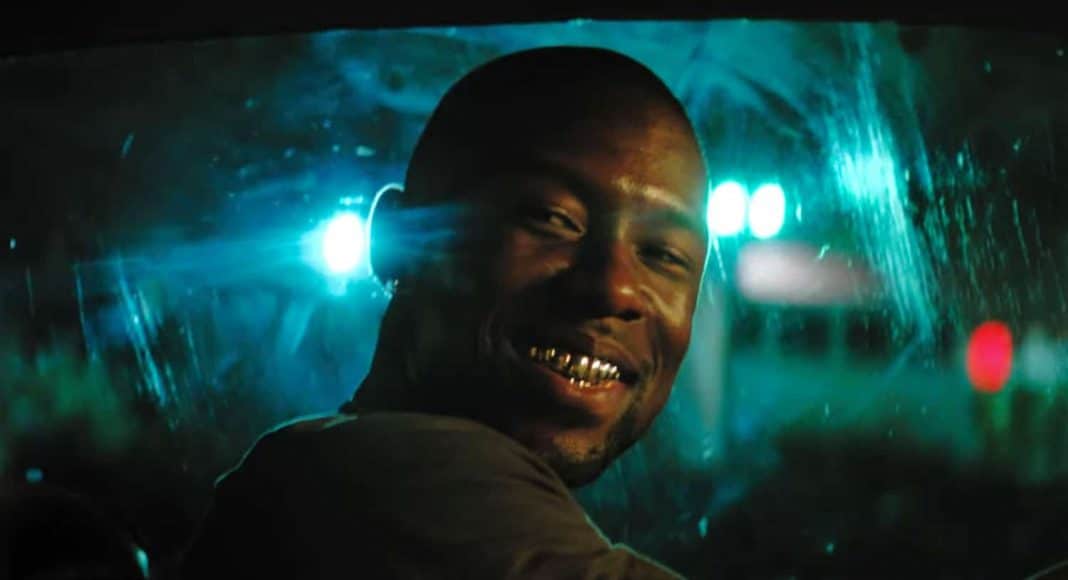The achingly tendered and gorgeously rendered Moonlight does not asks its audience many questions; instead it lands on just one. In so many ways, it’s the only question that matters.
Told through three pivotal episodes of his life—from a misbegotten child to an angsty teen and finally a hardened, yet still-fractured adult—we watch the young, black boy Chiron ruptured, neglected, bullied, exposed, caressed, used, abused and more. But for so much of the film, Chiron reacts in the same way: he retreats inward. His face appears so often numb and not by his choice. Though played by three separate actors, his eyes repeatedly scurry like a caged animal, expecting some new danger or threat. He carries with him the presence of someone desperate to be anyone else, but also a hidden desolation knowing he cannot.
“At some point, you gotta decide for yourself who you gonna be. Can’t let nobody make that decision for you,” instructs Juan, a drug dealer who serves as a father figure to Chiron when he’s young.
“Who is you, Chiron?” asks Kevin, a childhood friend, when Chiron returns home in his mid-twenties.
Chiron does not respond to either of them for a simple reason: he doesn’t have an answer. Deciding one’s identity weighs heavily upon the mind of director Barry Jenkins and his film. Though he tries to deny it, Chiron is a young, black, and gay man living in a world that doesn’t favor kindly to any of those attributes. His own mother calls him a “faggot.” His classmates play games like “Smear the Queer” and call him the embarrassing nickname Little.
The mastery of Jenkins’ work here, then, is how he manifests a mood perpetually lurking and encroaching upon Chiron as he desperately seeks connection with others and himself. Throughout the film, the camera frames Chiron with his back toward us and on the move—either fleeing the torment of bullies or trying to leave behind some undesired part of his being. The camera shakes to keep pace with a boy in such heightened flux. He’s chasing answers, craving to understand why the world and those closest to him have wrought such pain and confusion upon Chiron. Is there something wrong, something broken inside him? And can it even be fixed?
Every love Chiron finds carries a double-edged nature. While Juan embraces Chiron, protecting and enabling him in many ways, he’s also the drug dealer who sells Chiron’s mother crack rocks. Though Juan’s girlfriend Teresa (played by a grounded, no-frills Janelle Monae) serves as a second mother to Chiron, giving him the delicate reassurance he needs, he’s constantly reminded by his own mother that Teresa isn’t his “real mom.” Kevin might be the only who really understands Chiron, who shares an extreme tenderness with him, but when Chiron needs him most, Kevin also succumbs to teen peer pressure and sucker punches Chiron to maintain some masculine stature within social circles.
Though set in drug-addled Miami housing projects, Jenkins returns us again and again to the beach. It plays a cleansing respite to young Chiron and the site of his first kiss and more with Kevin. But beyond the beach lies the ocean, always churning and eroding those sands, reminding us of our impermanence, withholding a forever sense of unknowability. Even when characters aren’t there, Jenkins reminds us of its vast presence, sounds of waves crashing and mentions of salt-stenched breezes.
Moonlight’s power lies in its specificity. Based on the play “In Moonlight Black Boys Look Blue” by Tarell Alvin McCraney, it conveys young, black men in portraits so often denied in popular culture. Tender, intimate, vulnerable, blue. As creatures longingly seeking love, and believing they have a right to that love. Persons as products of an unjust “war on drugs,” of carelessly blighted environments, of masculine exteriors foisted upon them. None of it is played cheaply either; it is not a heavy-handed metaphor. Instead it represents achingly-feeling characters searching for their place in this weary world.
Jenkins has been careful with the marketing and labeling of this precious film. Though he mostly shirks comparisons and genres, he’s also called it a “hood-arthouse coming-of-age LGBT drama.” And even that falls short of describing this masterpiece of a film. This movie is fully animate, shouting from the beach across the ocean, “I’m broken, you’re broken, we’re all broken. Can’t we be broken together?”
Truthfully, my thoughts still aren’t fully formed on this film. Walking out of the theater, I had that numbed daze I sometimes have after experiencing something so magnificent, so total, something so heartbreakingly raw. All I know is I’ve never seen anything like Moonlight. I know how rare it is to create something so original and sensitive in our derivative culture. If you’ll excuse the metaphor, I know I want to bask in the moonlight once more, to feel something that pure. And I know, deep down, in emotions so private we never speak them aloud, even to ourselves, everyone does.


